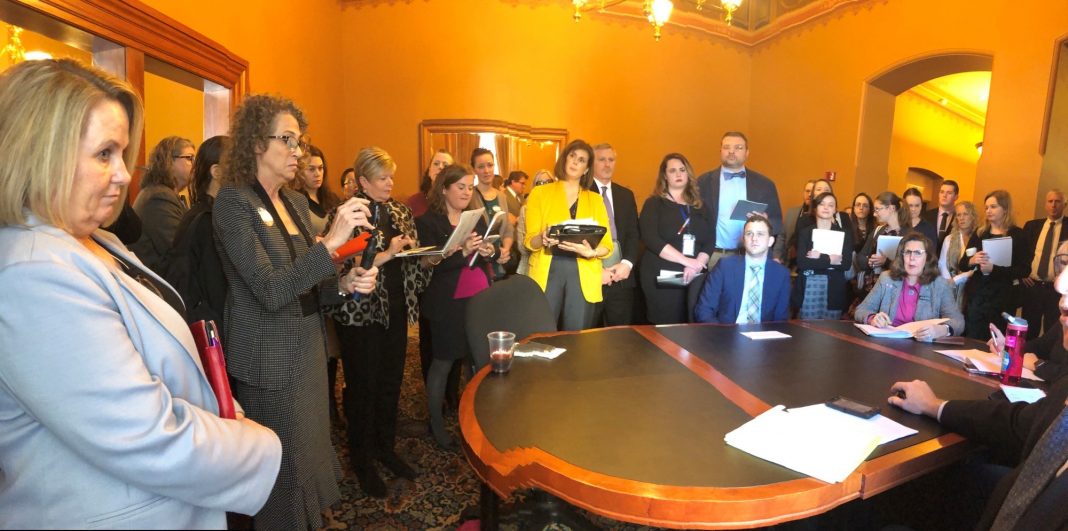House File 2141 would require the Department of Public Health to include certain information on vaccine advertisement.
That information includes the federal law that provides vaccine manufacturers immunity from liability for damages from a vaccine-related injury or death.
“I am not an expert on vaccinology and I have no formal training,” said Rep. Jeff Shipley, the author of the bill. “I am a legislator and I believe the chief duty as a legislator is to inform the public on what the law actually says. My experience interacting on this issue does seem to be kind of a disconnect in what the public understands to be true and what the law often says. Often a person believes the exact opposite of what the law says.”
The Iowa Immunization Program allows the Health Department to use public money to advertise and market corporate pharmaceutical products. Shipley wants to make sure parents are informed that vaccine manufacturers cannot be held liable for injuries or deaths associated with the administration of vaccines.
“It’s a very interesting law,” Shipley said. “There’s a lot to unpack there.”
Iowa has the responsibility to inform the public of what the law says, especially when Iowa is paying to advertise a product that financially benefits a private corporation. Shipley also wants Iowans to know there is no scientific evaluation on the long-term safety of vaccines.
“This is a chance for the state of Iowa to really get out in front with this,” Shipley said. “Some opponents might say this will affect vaccination rates, but again, it’s what the law says. If that causes that, then we should change the laws and start over.”
Meg Oberreuter spoke in support of the bill. She said she’s a mother of three vaccine-injured children and also a nurse.
“I gave vaccines for almost 20 years, so I’ve seen both sides of it,” Oberreuter said. “We need to do more informed consent.”
Mary Nelle Trefz, with the Iowa Family Policy Center, spoke against the bill.
“Obviously we want parents and families to be informed about vaccinations, but we believe federal regulation already provides significant information to inform parents on vaccinations.”
She said the group is concerned adding additional information would confuse parents and contribute to fear and lead to fewer parents and children getting vaccinated.
Lina Tucker Reinders spoke against the bill on behalf of the Iowa Public Health Association.
“I have three children,” she said. “I do not fear my children getting these diseases because our culture of vaccination. My grandparents could not have said the same thing. They did fear these diseases for their children.”
Reinders said vaccine hesitancy is one of the top-10 threats to global health, according to the World Health Organization.
Connie Ryan of the Interfaith Alliance of Iowa Action Fund also opposed the legislation.
“I’m gravely concerned about the idea that we are going to put into code half of the information,” she said. “We’re going to talk about all of the, any kind of negative effects, but not give adequate information on the positive reasons for doing vaccines.”
Susan Cameron Daemen said she is registered undecided, but the groups she represents are “very pro-vaccination.”
“They’re not afraid of information being out there, but they want to make sure that the information that has been said is balanced,” she said.
Shipley said it’s important to remember these requirements would apply to advertisements, which are promoting the benefits of vaccines.
Amy McCoy with the Iowa Department of Public Health said they want families to have accurate information to make the right choices, but there are parts of the bill that are duplicative to what’s already being done.
“Extensive amounts of vaccine information is shared with families,” she said.
When children receive immunizations, parents are supposed to be given an information sheet that includes any adverse risks.
“All families are receiving that information when they go to the doctor’s office,” she said.
McCoy also said there would be a substantial cost to the department. She added that some of the language does not align with CDC guidance.
Janae Vos Vander Wilt spoke in support of the legislation. She said she’s a mother of six. Her oldest three children were vaccinated according to schedule, and she added she never once received any information like McCoy handed out on the vaccines. Her oldest child is vaccine injured and was not reported.
“The nurses did some really good mom-shaming about it not being a big deal,” she said. “To balance out the advertisement, it is just common sense.”
She finished by saying that her youngest three children are not vaccinated according to schedule. They’re either on a delayed schedule or haven’t started receiving vaccines yet. And, she added, they are healthier than the older three “by far.”
Dr. Nathan Boonstra is a pediatrician at Blank Children’s Pediatric Clinic. He said the bill could lead to unwarranted vaccine hesitancy. He also said the proposal may mislead parents without “strictly accurate” information.
Boonstra referred to adjuments and said the only adjuvant in vaccines is aluminum salt. And, he said, it has a long track record of safety.
“Parents are already informed well,” Boonstra said.
Julya with Informed Choice Iowa said the group supports the bill because they support informed consent.
“In regards to all of this information, it’s very basic information, but for some reason it’s not readily available on the advertising,” she said. ”
Bethany Steichen has a 7-year-old child who is vaccine-injured. She said he had a stroke after his two-month vaccine and suffered brain damage. By the time she was informed, the statute of limitations had passed for the vaccine injury program.
Shanda Burke is a certified medical assistant who has given hundreds of vaccines. She said the vaccine information sheet is typically presented to a parent about three seconds before the child is vaccinated and they’re not instructed to read it. They’re told to take it home and read it, but parents rarely take them home.
“That is not informed consent,” Burke said. “Parents need to be getting informed consent.”
More mothers spoke in support of the bill, calling it common sense. Almost all of them mentioned not receiving vaccine information sheets.
Sonya Swan spoke in support of the bill on behalf of Iowans for Informed Consent.
“Most parents whose children receive vaccinations are currently not informed about any of these matters,” she said. “Although the vaccine information statement is required by federal law, our surveys show that most parents are not being given the most basic information.”
The bill, Swan said, would increase trust in the patient-caregiver relationship. She said doctors receive very little training in medical school regarding vaccine ingredients and side effects, or the 1986 law.
The real question, she said, is why we wouldn’t want parents to know there is no liability for vaccine manufacturers.
Lindsay Maher supported the bill, saying not enough information is given to the public. She said as a financial advisor is required to go through every disclosure with a client before signing off on a product, so why isn’t the same attention given to vaccines.
“There’s not enough long-term science to determine whether or not the chronic illness uptick is associated with this,” Maher said.
Audits are done every year to make sure offices have the vaccine information sheets.
Representative Tom Moore said that audits may need to change because those information sheets weren’t readily available.
Representative Sandy Salmon said a lot of people have experiences where someone is not complying with the law in terms of the information sheets.
“That’s troubling,” she said. “The other thing that really hasn’t been brought out that much is, I don’t think people realize that the vaccine manufacturers are not liable. So we are relying on manufacturers of a product for our health and safety and they cannot be sued. They are not liable. That’s very concerning. I think that’s a very important fact that they have no financial incentive to make a safe vaccine. That is a very important fact I think parents ought to know.”
Reinders spoke again, saying vaccines are one of the greatest public health achievements of our time. She said implying that those involved with making vaccines have an interest in harming the population is offensive.
“There are inherent risks in any singular activity we take,” she said. “Yes, we need to have informed consent. We also have trust in our science and medical professionals. Parents can’t be experts in every single area. I put trust and faith into research, science and evidence.”
Maher asked how many diseases the medical community vaccinates for. The answer is 16.
“How many pathogens are there in the world,” she asked. “Thousands. We vaccinate for 16 out of thousands. Each of those 16 pathogens we’re vaccinating for has multiple strains.”
Representative Beth Wessel-Kroeschell said she’s a “huge advocate” for vaccinations. Her children, she said, are fully vaccinated and as healthy as can be.
“Maybe they had a low-grade fever and got a little grumpy after a vaccine, but that was a very small price to pay for everything that we didn’t have to go through — including chickenpox,” she said. “If we are having problems with having accurate information go out, I would strongly recommend making a phone call to the clinic, to the licensing boards of individuals being licensed and not following federal law and let them know.”
Wessel-Kroeschell did not sign off on the bill
Salmon was willing to support the legislation.
“Trust in medical professionals and all the science and all that is fine and good until you’re the one who suffers from the negative effects of vaccination and you’re the one who has a child who is injured and you have to deal with that for the rest of your life,” Salmon said. “That’s why this is really a freedom issue. It’s just so important that people have the freedom to decide what to put inside their bodies and how to care for their children.”
Moore, the chair of the subcommittee, said he wasn’t sure what to do.
“I think our conversation degraded to the value of immunizations over the value of information,” he said. “I can’t honestly say I got any kind of information. It was just something that as a parent you either did or you didn’t do.”
He speculated if the increase in chronic illness is related to the vaccines.
“Our parents need information,” he said. “I would like to see the fact that parents be made aware in any of this information that these vaccine companies cannot be sued. I’m sorry, I think it is imperative that parents know that.”
He decided to indefinitely postpone the bill. Moore said he wanted information on what language is duplicative and what language doesn’t align with CDC guidelines.
FRUSTRATED WITH FAKE NEWS? THIS IS YOUR CHANCE TO DO SOMETHING ABOUT IT!
If you are someone who believes the media refuses to give a fair shake and just report the facts, then consider supporting The Iowa Standard.
The Iowa Standard is a free online news source so we can reach as many people as possible. But we need to raise money! We are asking our readers to help support us as a news alternative entering 2020. If you could, please consider showing a sign of support to The Iowa Standard by making a contribution here. Or, you can use Venmo and make a contribution to @Iowa-Standard-2018.
You could also send a check to:
PO Box 112
Sioux Center, IA 51250












